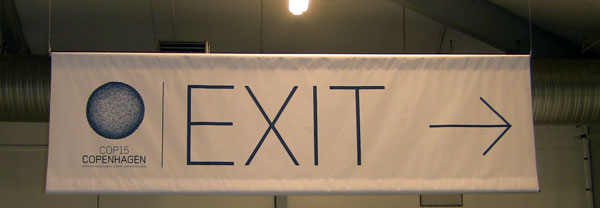
By the time you read this I’ll be on my way back to Toronto, and since I’m afflicted by an embarrassing amount of anxiety whenever I’m separated from the internet for more than a few hours, I thought it might calm my nerves to know that this post was scheduled to go live in my absence, communicating with the internets on my behalf.
This is by no means an exhaustive list, but here are some things I’ve learned this week that I don’t think I could have gotten from just following the news coverage from back home.
Canada’s international reputation really is very damaged. That’s not eco-spin or a partisan jab, it’s the reality on the ground. You can see it in people’s eyes when you introduce yourself as Canadian, and hear it in their voices as they ask how we went so wrong. I now understand first-hand what George Monbiot meant when he said that Stephen Harper risks doing to Canada what George Bush and Dick Cheney did to the United States. By the end of the week members of the Canadian Youth Delegation had actually sewed American flags onto their backpacks.
Speaking of youth, they really are having an incredible impact. I’d wondered if reports of youth influence was just pandering, but the members of the youth delegation I saw in action are truly some of the most engaged, intelligent, passionate, and affective people here.
Despite claims by some of the government’s defeatist defenders (“Canada isn’t significant enough to have an impact on the talks anyway”), Canada could have taken a major leadership position at this conference. I’ll point to two pieces of evidence. First, an account of the Rio climate talks told by Jean Charest at a press conference Wednesday morning (and confirmed by former MP David MacDonald, who’s traveling with me and was in government at the time), at which Canada was the first G7 country to sign the deal at a critical moment, convincing others to follow. Second, the fact that countries like Tuvalu and Maldives have dominated this conference due to their strong leadership, and despite their extremely small size.
There are lots of easy obvious things we could be doing that Copenhagen and other European cities take for granted. Escalators and hallway lights are all motion activated. My hotel room has a “master switch” by the door that lets me turn off all the power in the room before I leave. All toilets have two flush options. I bought a drink of Gløgg at an outdoor stand and put a deposit down on the cup, then got the deposit back by returning my cup to an automated station. All simple ideas we seem to have not even considered.
People who live in Copenhagen are hard core. It’s freezing, it’s night time, there’s snow on the ground, and they’re still cycling around the city in large numbers. And they look like they’re enjoying it.
“My hotel room has a ‘master switch’ by the door that lets me turn off all the power in the room before I leave.”
In other European cities the hotel room forces you to turn off all power before you leave. When you enter you have to put the key in a slot just inside the door to be able to turn the lights on, tv etc. When you leave you must take the key out of the slot, which means it is impossible to waste any energy while you are out. This was in Portugal about 6 years ago.
As for deposit and cup return, I remember this being normal in Canada in the 1970s and early 80s with various bottled drinks. We really have gone backwards as a society and such solutions are so painfully simple, there are a million of them, and they don’t require the transfer of billions of dollars between countries. They are free solutions, they simply must be legislated ie: you cannot be in business if you do not have these things in place, which benefits both businesses and society by their implementation.
As an engineer, I totally love techno-fixes such as a master power switch on a room.
We need to redefine civilized living as living in a way that minimizes our environmental footprint.
I attended my elderly grandmother’s Xmas get-together at a suite at the Fairmont Royal York. I was pleased to notice that the hotel featured real mugs and spoons instead of styrofoam & stir sticks with their in-room coffee maker, as I have seen at many a cheap motel.
One always assumes that posh hotels are more wasteful, but in this case they were more reusable and less disposable. I guess part of it is because in Canada, it’s more expensive to pay someone to clean something than to buy disposable and throw it out. We need tax shifting to fix this, clean things up, and create more jobs.
American flags? That’s crazy! :)
Interesting reading about your trip and what transpired.
I’m in Australia right now and they even have the two two flush toilets – mostly due to water shortages, but I think people sometimes people forget that it takes energy to pump water and, if I’m not mistaken, more energy than necessary because some of the water systems in Canada are in disrepair (Torotno for sure). Japan uses water that was used for hand washing to flush toilets – now that’s smart.
We do need legislation on simple things like toilets. If we can make more fuel efficient cars we can definitely make more water efficient toilets!